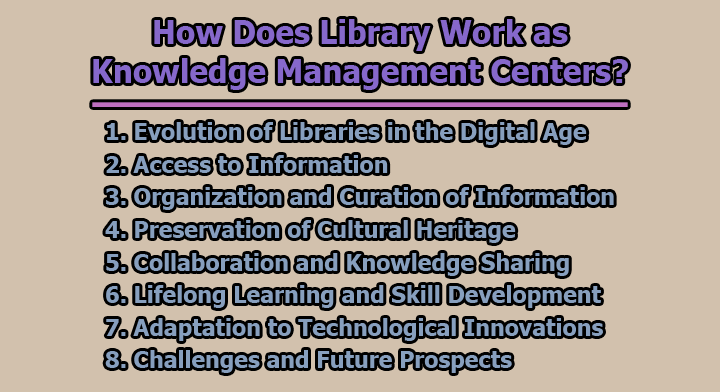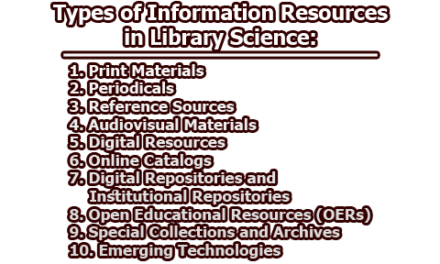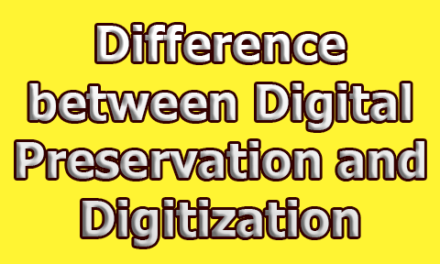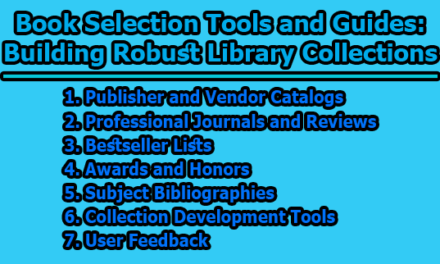How Does Library Work as Knowledge Management Centers?
Libraries have long been considered the guardians of knowledge, serving as repositories of information and fostering a culture of learning. In recent years, the concept of libraries has evolved beyond traditional bookshelves, embracing the role of knowledge management centers. This transformation is driven by the digital age, where information is abundant and dynamic. In this article, we will explore the following question, “how does library work as knowledge management centers?”
1. Evolution of Libraries in the Digital Age: Historically, libraries were synonymous with physical collections of books and manuscripts. However, the digital revolution has revolutionized the way information is stored, accessed, and shared. Modern libraries have adapted to this shift by embracing digital resources, e-books, online databases, and multimedia content. The transition from physical to digital collections has expanded the scope of libraries, transforming them into dynamic knowledge hubs.
2. Access to Information: One of the primary functions of libraries as knowledge management centers is to provide access to a vast array of information. Digital catalogs and online databases enable users to search and retrieve information quickly and efficiently. Libraries collaborate with publishers, researchers, and other institutions to offer an extensive range of digital resources, breaking down geographical barriers and ensuring that knowledge is accessible to a global audience.
Moreover, libraries play a crucial role in bridging the digital divide. Many libraries offer public access to computers and the internet, allowing individuals who may not have personal access to technology to connect with digital information. This inclusivity is vital for empowering diverse communities and fostering equal opportunities for education and knowledge acquisition.
3. Organization and Curation of Information: In the digital landscape, the sheer volume of information can be overwhelming. Libraries serve as knowledge management centers by curating and organizing information, making it more manageable for users. Librarians, often equipped with information science and technology skills, play a pivotal role in categorizing and tagging digital content, ensuring that users can navigate through vast databases with ease.
The implementation of metadata and classification systems enhances the discoverability of resources. Additionally, libraries employ advanced search algorithms and artificial intelligence tools to assist users in finding relevant information efficiently. This organized approach to information management is essential for optimizing the utility of the vast digital repositories at the disposal of libraries.
4. Preservation of Cultural Heritage: Libraries have traditionally been custodians of cultural heritage, preserving manuscripts, rare books, and historical documents. In the digital age, this role has expanded to include the preservation of born-digital materials. Libraries employ sophisticated digital archiving techniques to ensure the longevity and accessibility of digital content, safeguarding it for future generations.
Preserving cultural heritage in digital form presents unique challenges, such as format obsolescence and data degradation. Knowledge management centers actively address these challenges by implementing strategies for digital preservation, including regular backups, format migrations, and adherence to international standards for archival practices.
5. Collaboration and Knowledge Sharing: Libraries have emerged as collaborative spaces where individuals and institutions come together to share knowledge. This collaborative ethos extends to both physical and virtual realms. In physical spaces, libraries host seminars, workshops, and community events that facilitate the exchange of ideas. In the digital sphere, online forums, virtual book clubs, and collaborative research platforms enable users to connect and share knowledge across borders.
Furthermore, libraries actively engage in partnerships with educational institutions, research organizations, and government bodies. These collaborations contribute to the creation of interdisciplinary knowledge networks, fostering innovation and addressing complex societal challenges.
6. Lifelong Learning and Skill Development: Libraries play a pivotal role in supporting lifelong learning and skill development. In addition to providing access to formal educational resources, libraries offer a myriad of informal learning opportunities. Digital literacy programs, coding workshops, and online tutorials empower individuals to acquire new skills and adapt to the evolving demands of the digital age.
Knowledge management centers also facilitate continuous professional development by offering access to industry-specific resources, research publications, and online courses. In doing so, libraries contribute to the cultivation of a knowledge-driven society that values continuous learning as a cornerstone of personal and professional growth.
7. Adaptation to Technological Innovations: To remain effective as knowledge management centers, libraries must stay abreast of technological innovations. The integration of emerging technologies such as artificial intelligence, augmented reality, and blockchain enhances the capabilities of libraries in managing and disseminating knowledge.
For instance, artificial intelligence can be employed to analyze user behavior and preferences, providing personalized recommendations for resources. Augmented reality applications can transform the library space into an immersive learning environment, while blockchain technology can enhance the security and transparency of digital archives. By embracing these innovations, libraries position themselves as dynamic entities capable of navigating the ever-evolving landscape of information management.
8. Challenges and Future Prospects: While libraries have made significant strides in adapting to the digital age, they face challenges that require careful consideration. Issues such as information overload, privacy concerns, and funding constraints pose ongoing hurdles for knowledge management centers. Balancing the preservation of privacy with the need for data-driven services, ensuring equitable access to digital resources, and securing sustainable funding models are critical aspects that libraries must address to thrive in the future.
Looking ahead, the future of libraries as knowledge management centers holds exciting possibilities. The integration of immersive technologies, the expansion of open-access initiatives, and the development of innovative collaborations are poised to reshape the role of libraries in society. As guardians of knowledge, libraries will continue to evolve, embracing change and leveraging technological advancements to remain indispensable in the ever-expanding landscape of information management.
In conclusion, libraries have undergone a remarkable transformation from traditional repositories of books to dynamic knowledge management centers. The digital age has propelled libraries into new dimensions, where they actively engage with technology, collaborate across disciplines, and adapt to changing user needs. As custodians of information, libraries play a crucial role in providing access to a vast array of resources, organizing and curating information, preserving cultural heritage, and fostering collaboration and lifelong learning. The challenges they face are met with resilience and innovation, positioning libraries as essential pillars of knowledge in an ever-evolving world.

Library Lecturer at Nurul Amin Degree College










